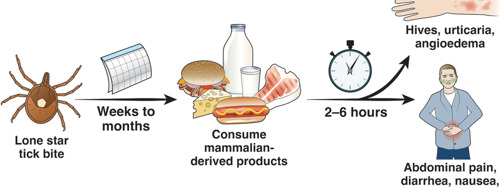What is Mammalian Meat Allergy?
Understanding Mammalian Meat Allergy Triggered by Tick Bites
While there are many triggers of anaphylaxis, one of the more unusual is mammalian meat allergy.
This allergy develops after a person has been bitten by a tick. These patients may become allergic to all mammalian meat - beef, pork, lamb, kangaroo, and also allergic to meat products, including dairy and anything containing gelatine, glycerine or substances which include traces of animal by-products such as toothpaste, moisturisers and wine. There have been cases of people developing mammalian meat allergy after tick bites and it may manifest as anaphylaxis up to 12+ hrs after ingestion.

Alpha-gal: The Culprit Behind Mammalian Meat Allergy
This allergy is produced by a reaction to Alpha-gal (galactose-alpha-1,3-galactose) which is a carbohydrate found in the blood of all mammals except for humans and the great apes. When ticks bite a mammal such as a bandicoot, possum or rat, they pick up the alpha-gal, and then it is transferred to humans via the tick bite.
If you would like to know more about anaphylaxis, envenomation and more, consider:
- The ALERT Course (Acute Life-threatening Emergencies Recognition and Treatment)
- Responding to Anaphylaxis - Minutes Matter
- Emergencies in General Practice
Article last reviewed September 2023 by Susie Helmrich.
References:
Jackson WL. 2018. Mammalian meat allergy following a tick bite: a case report. Oxf Med Case Reports. 2018 Feb; 2018(2): omx098. Published online 2018 Feb 21. doi: 10.1093/omcr/omx098. PMCID: PMC5822700. PMID: 29492269.
van Nunen SA. 2018. Tick-induced allergies: mammalian meat allergy and tick anaphylaxis. Med J Aust; 208 (7): 316-321. doi: 10.5694/mja17.00591. Published online: 16 April 2018

Ken Hambrecht RN, ICU Cert., B.Sc, (Physiology & Biochem.), M.I.Biol, M.Ed., J.P. MACN, has extensive experience in Critical Care practice & Medical education. This includes more than 25 years co-ordinating & teaching Critical Care Courses and other Medical Education. Ken is the Founder and Principal Consultant for Critical Care Education Services.
In recognition of his outstanding contribution to medical education, Ken has been awarded honorary life membership of the Australian College of Perianaesthesia Nurses (ACPAN). Ken has also been a member of the Australian Resuscitation Council, including the Advanced Life Support Committee.
Become a member and get unlimited access to 100s of hours of premium education.
Learn moreFollow James, a 7-year-old boy scheduled for a tonsillectomy and adenoidectomy, as we explore how the 4 P’s of child preparation – Prepare, Play, Parent, Praise – can be used in day surgery to reduce procedural anxiety, support family-centred care, and improve the overall patient experience
Caregiver concern is a powerful predictor of clinical deterioration in children, often surpassing abnormal vital signs. A recent Lancet study confirms its association with ICU admission and ventilation. Integrating caregiver input into assessments, documentation, and escalation protocols can significantly improve early recognition and outcomes in paediatric emergency care.
Sepsis is a time-critical medical emergency. The National Sepsis Program urges GPs and primary care clinicians to enhance early recognition and management of sepsis to save lives. This update outlines key actions and available resources to support timely diagnosis and intervention across primary care settings.
